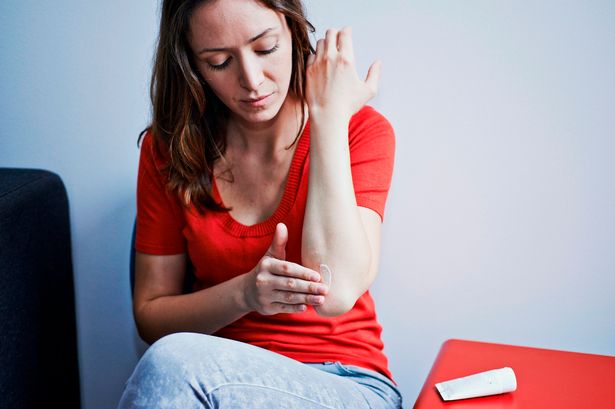Doctors have shared their top tips for travelling with eczema, offering some wise words for people who find heading to different countries can aggrevate the condition
I am very lucky to travel for my work. It’s something I love to do and which has filled my life with eye-opening experiences and encounters.
One aspect of my travel that I don’t love is what it does to my skin. As a mid-tier eczema sufferer, it is possible to arrange my life, clean my flat and eat in such a way that keeps my skin in a pretty balanced, comfortable-enough state. When I travel however, that goes out of the window.
The combination of early starts, sleeping in a hotel room, eating new foods, and drinking holiday amounts of alcohol, all within a new weather system and time zone, means I end most trips not with a lovely tan, but with a flare-up.
Everyone who has a skin condition will know that there is no cure-all for any of them. It’s all about finding the right solution, or combination of solutions, for you. With that in mind, I asked doctors for their best advice for eczema-sufferers who love to travel.
READ MORE: Brits heading to Greece on holiday face new bans in two monthsREAD MORE: Theme park attraction specialist’s one thing you should never do during a visit
Bring your own bedding
“Exposure to new allergens, such as different detergents, bedding, or even local plants, can also provoke flare-ups.”
So says Dr Vincent Wong, who has an extensive background in dermatology and experience in treating eczema.
Given that, controlling what you put next to your body is one of the best ways to stop a flare-up. The one thing I always pack now when I travel is a pillowcase, which I swap for the one provided in the hotel or Airbnb. While it might not reduce irritation on the rest of my body, it stops my head and face from getting wound up by the intense detergents often used in hotels.
Dr Dilpreet Hoonjan, a qualified medical doctor who specialised as a GP, eczema sufferer and now the founder of a steroid-free skincare brand, suggests going further.
“To reduce the chances of a flare-up you’ll need to pack protective clothing such as long-sleeved pyjamas to reduce irritation from bedding or pack a lightweight cotton pillowcase or sheet from home as this can create a protective barrier against accommodation linens,” the doctor advised.
Keep fresh and clean
Seasonal changes are the bane of the eczema sufferer’s life. Not only does autumn spell the end of summer and the start of specialist-latte-mania, it also brings with it dried-out skin as the rains and Celsius begin to fall.
Being away from home, in a different climate, can have the same effect. Which is why being mindful of what you wear is key.
Dr Hoonjan suggests: “Pack breathable cotton clothing for daytime which helps minimise sweat build-up. If you’re outdoors or in hot climates, shower more frequently to remove sweat (as this is a common trigger), but always moisturise immediately afterwards to prevent dryness. Pack your skincare products that you use regularly, you can pack these in travel-sized containers. Pay attention to known dietary triggers and choose meals that won’t aggravate your skin.”
Pack the right skin treatment
Choosing the right medication is a serious matter and something that you should discuss with your doctor.
When it comes to using moisturiser, consistency is key.
Dr Wong advises: “Carry a travel-sized moisturiser and apply it regularly, particularly after washing. Fragrance-free and microbiome-friendly cleansers and body products are especially helpful, as they minimise irritation while supporting the skin’s natural ecosystem.
“When the skin’s microbiome is balanced, it strengthens the barrier and makes flare-ups less likely, which is particularly important when you’re exposed to new environments and stressors while travelling. It is also important to continue using any prescribed topical treatments exactly as directed, even during short trips, to maintain control over symptoms.”
READ MORE: ‘I’ve visited every country – one luggage essential is a complete waste of time’READ MORE: ‘I went on UK rail route named world’s most beautiful and it lived up to the hype’
Maintain good sun practices
The sunshine can feel like a bit of a miracle cure for the British eczema sufferer. The end of the long winter is over, when the rays finally begin to break through the clouds, always signals a marked improvement in my skin.
Boots Online Doctor, Dr Megha Pancholi, warns that the positive impacts of sunshine on eczema do not mean it won’t also burn you if you’re not careful.
“Some people find that sunlight can help their dry skin condition, while others may find it can trigger flare-ups. It’s important to protect your skin when outdoors all year round. Travel-sized, fragrance-free sunscreen and hats can help shield skin while outdoors,” Dr Pancholi suggests.
Monitor and record
According to Dr Pancholi, keeping track of your symptoms and potential triggers can be very helpful when it comes to treating the condition.
“Keep a brief diary of foods, activities, and environments that seem to trigger flare-ups. This can help you anticipate and prevent future reactions,” she says.
“If you notice a new skin issue while travelling and you’re struggling to see a healthcare professional, tools like the Boots Online Doctor SmartSkin Checker* can be helpful. By uploading a photo of the affected area, it gives an AI-assisted idea of possible skin conditions, offering a useful starting point before you can get expert advice.”
